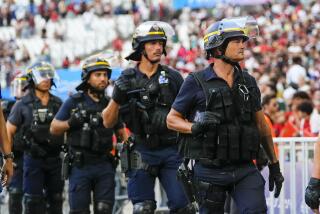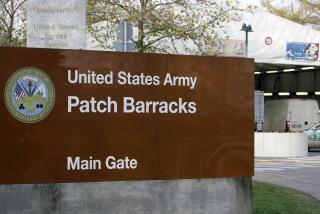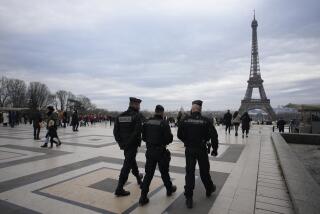Detentions Signal Fear in Europe
- Share via
PARIS — PARIS -- With police across Europe on guard against a heightened threat of attack, a British court Monday ordered three Algerians, including an alleged senior Al Qaeda figure, held on suspicion of terrorist activity. French police made three more arrests in a separate case.
Authorities say their security forces have stepped up activity because of indications that Al Qaeda intends to strike in Europe, where it has recruited fighters and planned operations -- but has not successfully carried out an attack. Recent warnings, some concrete and others vague, have generated fear of a major attack in Britain, France or another nation.
“I think the threat in Europe is the highest it has been since Sept. 11,” a top French law enforcement official said Monday.
British authorities gave few details about the case against the Algerians, whom a judge ordered held for a month without bail pending investigation of suspected “preparation, instigation or commission of terrorism.”
But officials denied media reports that the three had been planning a poison gas attack on London’s subway system.
“It doesn’t appear to be that there is any evidence whatsoever there was going to be a gas attack or indeed use of bombs regarding the three people who have been arrested,” Deputy Prime Minister John Prescott said in an interview with the BBC.
One of the suspects, Rabah Kadre, is a heavyweight in Europe-wide Al Qaeda groups based in London, according to French and Belgian investigators. Kadre, 35, was a close associate of Abu Doha, the alleged leader of an Algerian-dominated network and accused mastermind of a failed attempt to bomb Los Angeles International Airport in 1999, investigators say.
Kadre also was an active recruiter sending French Muslims to Afghan training camps, according to authorities.
British police arrested Abu Doha and Kadre in February 2001 as they attempted to leave London for Saudi Arabia, according to Italian court documents. Abu Doha was held on terrorism charges. Kadre, who was suspected of an immigration violation, was released, according to authorities.
Kadre allegedly assumed Abu Doha’s duties as a leading figure in the mostly Algerian and Tunisian networks that are trying to regroup despite a police crackdown since the Sept. 11 terrorist attacks, investigators say.
British police arrested Kadre again Nov. 9 along with Rabah Chehaj-Bias, 21, and Karim Kadouri, 33, both described as unemployed Algerians living in London. After spending time in Slovakia with a fraudulent French passport, Kadre returned to Britain a few days before his arrest, according to Slovak authorities and media reports.
Official silence contributed to a climate of confusion in London, where authorities were trying to strike a balance between alerting the public and preventing panic.
Commuters were greeted by tabloid headlines about an aborted chemical attack on the sprawling underground transit system, known popularly as the tube, but officials said the stories were groundless. Defense lawyers said their clients had not even been questioned about a possible subway plot.
Investigations in Afghanistan and elsewhere have demonstrated that Al Qaeda has experimented with primitive chemical weapons, a recurring topic in wiretaps and intelligence reports.
“Afghanistan showed they have the capability to use amateurish devices,” said private investigator Jean-Charles Brisard, who investigated Al Qaeda for a French intelligence service and now works for families of Sept. 11 victims who have sued Saudi Arabian officials and companies for allegedly supporting terror.
“We don’t know if they are able to use complex devices in terms of chemical weapons,” Brisard said. “We have seen primitive but dangerous weapons.”
The uncertainty and fear in Britain were exacerbated during the last two weeks. In an interview with a French newspaper earlier this month, the secretary-general of Interpol warned that Al Qaeda was preparing major simultaneous attacks in several countries.
French and Dutch intelligence services have reported picking up intelligence about possible terrorist plans to hit a British port with an explosives-laden truck on a ferryboat.
British Prime Minister Tony Blair and his home secretary, David Blunkett, warned last week of an intensified Al Qaeda menace.
“Barely a day goes by without some new piece of intelligence coming via our security services about a threat to U.K. interests,” Blair said.
The Home Office released a report last week warning that Al Qaeda might attempt to use poison gas or a radioactive “dirty bomb.” But shortly afterward, British officials substituted for that alert a report containing milder, more generic language.
Europeans have been further distressed by threats made in an audiotape attributed to Osama bin Laden that surfaced last week.
The voice on the tape hailed recent attacks by Islamic extremists in Yemen, Bali and Moscow and went on to single out Britain, France, Germany and Italy as enemies.
“In the European environment, there is a much higher level of concern,” said a U.S. official based in Europe. “The naming of names of countries by Osama bin Laden threw people.”
Weakened by the U.S. military offensive in Afghanistan and a crackdown worldwide, Al Qaeda and its affiliates have gone after European targets of opportunity in the Middle East and South Asia. A car bomb killed 11 French engineers in Karachi, Pakistan, in May, and a truck bomb killed a score of people, mostly German and French tourists, outside a historic synagogue on the Tunisian island of Djerba in April.
But even after the Sept. 11 attacks, some experts said it was unlikely Al Qaeda would attempt a major strike in Europe -- with the possible exception of France, a longtime target because of its colonial history in North Africa.
European law enforcement officials seem to have stayed on top of the networks that operate in Europe, and police have apparently broken up the few plots that got underway. Al Qaeda also has been thought to want to keep a lower profile in Europe so it can continue to use the continent as a base for recruiting, indoctrination and logistics.
“There was this perception that nothing will happen in Europe because it provides too much cover,” the U.S. official said. “That doesn’t exist anymore.”
The actual increase in the menace is hard to measure. France’s interior minister and others have cautioned that the heightened vigilance does not mean that an attack is imminent. There are fears that terrorists might want to use the approaching Christmas holidays as a backdrop. The U.S. official said Europeans also are concerned about a possible attack somewhere on the continent during this week’s North Atlantic Treaty Organization summit in Prague, the capital of the Czech Republic.
The bloodiest Islamic terrorist campaign in Europe in the last decade occurred in 1995 in Paris, where Algeria’s Armed Islamic Group bombed subway and train stations. The organization later became part of Al Qaeda.
Subways remain a worry. In Brussels last year, authorities learned that a security guard employed by the subway system had allegedly undergone training at an Al Qaeda camp in Afghanistan. Last month, Italian police wiretaps revealed that suspected terrorists in Milan had talked about an act that would leave “300 or 400 dead on the subway.”
A French investigation this month has revealed the role of surviving European networks in Al Qaeda’s counterattack on the West. French police Monday rounded up two men and a woman in the Belleville neighborhood in Paris as part of a probe of a network involved in the Djerba synagogue attack. The suspects, Tunisians from the same family, brought the total number of arrests in the case to six.
The suicide bomber in the Djerba case, a Tunisian immigrant who had lived in Lyon, France, allegedly got his orders by satellite phone from a top Al Qaeda leader in Karachi. And he had help from a support network in France, Germany and Spain, according to investigators.
More to Read
Sign up for Essential California
The most important California stories and recommendations in your inbox every morning.
You may occasionally receive promotional content from the Los Angeles Times.













